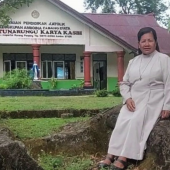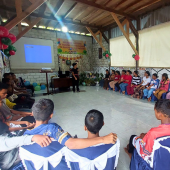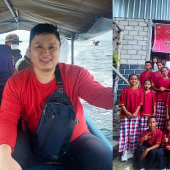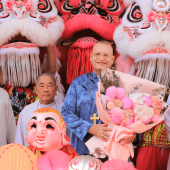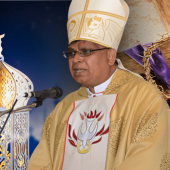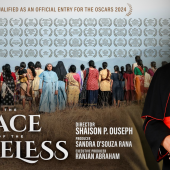A coastal city in West Kalimantan province ranks most tolerant city in Indonesia
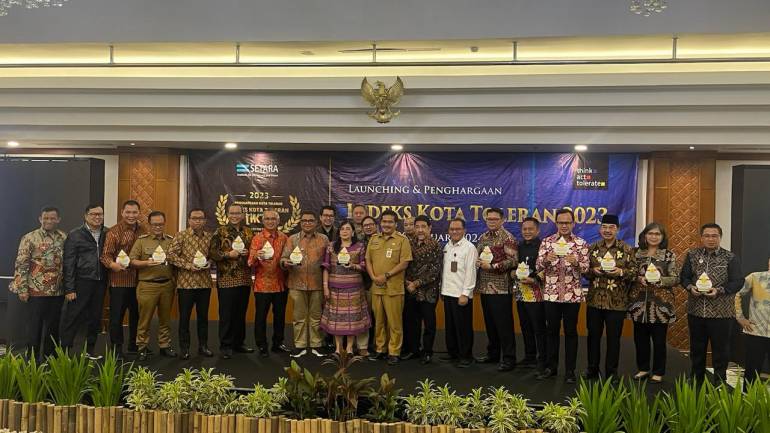
Singkawang, a coastal city and port located in the province of West Kalimantan, on the island of Borneo in Indonesia, is ranked the most tolerant city, according to research by a human rights group, the SETARA Institute, based in Jakarta.
The SETARA Institute carried out research to promote good practices of tolerance in cities in Indonesia, publishing the 2023 Tolerant City Index (TCI) report on January 30.
SETARA Institute for Democracy and Peace organizes activities on human security, religious freedom, law, and the Constitution.
The 2023 TCI is the 7th publication of the SETARA Institute since it was first published in 2015.
The TCI is a study measuring city performance, including city government and elements of society in managing diversity, tolerance, and social inclusion.
The TCI measurement combines the paradigms of citizens' constitutional rights through constitutional guarantees, human rights through international human rights law standards, and inclusive governance.
Through TCI, the SETARA Institute hopes to encourage every city to develop inclusive development plans, develop promotional policies, allocate budgets for promoting tolerance and inclusion, prevent incidents of intolerance, and strengthen collaboration in managing diversity, tolerance, national insight and social inclusion.
A tolerant city is a city that has an inclusive development vision and plan, regulations that are conducive to the practice and promotion of tolerance, progressive leadership for the practice and promotion of tolerance, low levels of intolerance and violations of freedom of religion or belief, and sustainable efforts in managing diversity and social inclusion.
The SETARA Institute in this study reduces the concept of tolerance into several city systemic variables that can influence social behavior between citizen identities and entities, namely: city government policies, actions of city government officials, behavior between entities in the city, including residents and residents, government and residents, and social relations in the demographic heterogeneity of city residents.
IKT adopts the framework of Brian J. Grim and Roger Finke (2006), namely a framework for measuring the level of religious freedom or degree of tolerance in a country.
In this framework, Grim and Finke developed three main indicators to measure the level of religious freedom or degree of tolerance: favoritism or government privilege towards certain religious groups; government regulations that limit religious freedom; and social regulations that limit religious freedom.
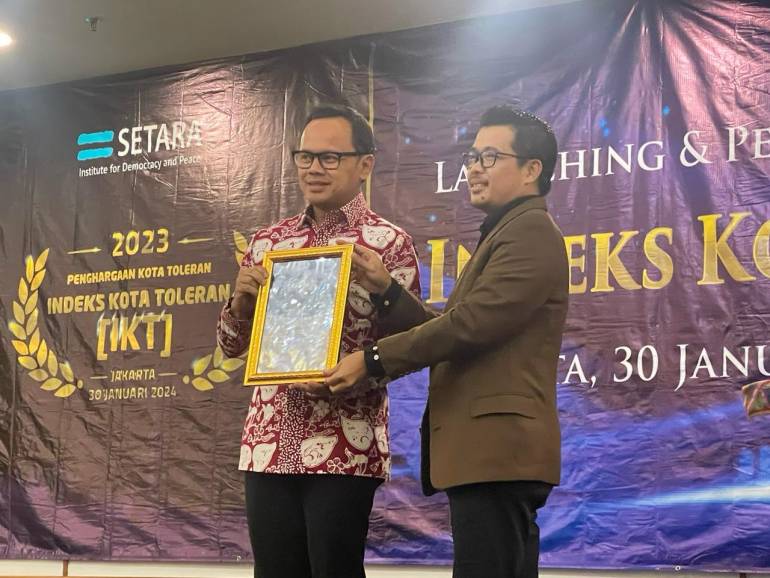
SETARA Institute, taking into account the uniqueness of Indonesia, modified Grim and Finke's framework with additional variables, namely socio-religious demographics.
Measuring the management of tolerance and harmony in the city includes considering the population composition as one of the parameters. It is assumed that the heterogeneity or homogeneity of a city's religious background can influence the quality of efforts made by the city government.
The objects of the TCI study are 94 cities out of a total of 98 cities throughout Indonesia.
The four cities eliminated are administrative cities in DKI Jakarta, which were combined into one city, DKI Jakarta. This merger was carried out because, administratively and legally, these cities do not have the authority to issue laws and regulations, so they are not valid to be assessed separately.
Referring to the operational definition and based on the indexing framework, the TCI study determines four variables with eight indicators as measuring tools.
A City Government Regulations had an indicator of development plans in the form of RPJMD and other supporting legal products, and the second Indicator was whether there are discriminatory policies.
Secondly, Social Regulation included incidents of intolerance and the dynamics of civil society regarding the issue of tolerance.
The government action was based on statements by key officials regarding the issue of tolerance and action regarding the issue of tolerance.
The socio-religious demography included religious heterogeneity in the population and socio-religious inclusion.
Research data sources were obtained from official city government documents, Central Statistics Agency (BPS) data, National Commission on Violence Against Women data, SETARA Institute data, and selected media references. Data collection was also carried out through self-assessment questionnaires for all city governments.
The innovations and breakthroughs made by cities, which are primarily aimed at institutionalizing tolerance and inclusive governance, are progressive-collective achievements that are the findings of this research. 2023 will be the year when cities ensure the institutionalization of promoting tolerance in the form of regional legal products. The vision of tolerance, which was previously at the level of incidental narratives and programs in 2023, has been transformed into systemic policies and programs outlined in regional regulations, mayoral regulations and sustainable strategic programs.
The achievements in the top 10 cities are the impact of fulfilling three aspects of leadership needed to strengthen the tolerance ecosystem in a city: social leadership, political leadership and bureaucratic leadership.
The ten most tolerant cities are Singkawang, Bekasi, Salatiga, Manado, Semarang, Magelang, Kediri, Sukabumi, Kupang and Surakarta.
Some of the recommendations the SETARA Institute made were that the central government, especially the Ministry of Home Affairs, the Ministry of Law and Human Rights, and the Pancasila Ideology Development Agency, needs to conduct a review of discriminatory regional legal products, both previous regional legal products and regional legal products published in recent years. These various legal products have become the runway for the growth of intolerant practices, both carried out by state and non-state actors.
The central government needs to issue regulations such as Presidential Regulations, which become a reference for cities in making regulations to ensure the strength of the legal framework for promoting tolerance in municipalities. At both state and non-state levels, promoting inclusive governance is encouraged as the main principle to respond to the challenge of the virus of intolerance.
The central government, especially the Ministry of Home Affairs and the Ministry of National Development Planning of the Republic of Indonesia/National Development Planning Agency (Bappenas), encourages collaboration in promoting tolerance through tolerant-inclusive development planning in 2024-2025. This need is in line with Indonesia's Vision 2045, which pays attention to aspects of tolerance, social cohesion, inclusivity and diversity.
The provincial governments are to be actively involved in the development of a tolerance ecosystem at the regional, city and district levels. Legal products that promote tolerance at the provincial level need to be adopted as legal products at the district or city level.
The central, provincial and city/district governments are to provide adequate budgets for initiatives to promote tolerance and inclusion.
Cities and districts, local governments and civil society are to collaborate to promote tolerance.- Emiliana Saptaningsih
Radio Veritas Asia (RVA), a media platform of the Catholic Church, aims to share Christ. RVA started in 1969 as a continental Catholic radio station to serve Asian countries in their respective local language, thus earning the tag “the Voice of Asian Christianity.” Responding to the emerging context, RVA embraced media platforms to connect with the global Asian audience via its 21 language websites and various social media platforms.









